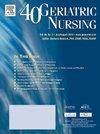The mediating role of expectations regarding aging between diabetes distress and self-management behaviors in older adults with type 2 diabetes mellitus
IF 2.5
3区 医学
Q3 GERIATRICS & GERONTOLOGY
引用次数: 0
Abstract
Objectives
To investigate the relationships among diabetes stress, expectations regarding aging, and self-management behaviors in older adults with type 2 diabetes mellitus.
Methods
In this cross-sectional study, we surveyed 257 older patients aged ≥60 years with type 2 diabetes mellitus using the Diabetes Distress Scale, the 21-item Expectations Regarding Aging Scale, and the Diabetes Self-Care Behavior Scale. We conducted correlation and mediation analyses using SPSS 26.0 and PROCESS software.
Results
Diabetes distress was negatively associated with diabetes self-management and expectations regarding aging. Expectations regarding aging were positively associated with diabetes self-management. Expectations regarding aging partially mediated the relationship between diabetes distress and self-management.
Conclusions
The self-management behavior of older patients with type 2 diabetes mellitus can be improved by reducing diabetes-related distress and increasing expectations regarding aging. Therefore, healthcare professionals should emphasize the mental health of older patients with type 2 diabetes mellitus and provide timely education on healthy aging.
对衰老的预期在 2 型糖尿病老年人的糖尿病困扰与自我管理行为之间的中介作用
目的探讨老年2型糖尿病患者糖尿病应激、衰老预期与自我管理行为的关系。方法采用糖尿病困扰量表、21项老龄化期望量表和糖尿病自我护理行为量表对257例60岁以上老年2型糖尿病患者进行调查。采用SPSS 26.0和PROCESS软件进行相关分析和中介分析。结果糖尿病焦虑与糖尿病自我管理和对衰老的期望呈负相关。对衰老的预期与糖尿病自我管理呈正相关。对衰老的预期部分介导了糖尿病痛苦与自我管理之间的关系。结论老年2型糖尿病患者的自我管理行为可以通过降低糖尿病相关焦虑和提高对衰老的预期来改善。因此,医护人员应重视老年2型糖尿病患者的心理健康,及时开展健康老龄化教育。
本文章由计算机程序翻译,如有差异,请以英文原文为准。
求助全文
约1分钟内获得全文
求助全文
来源期刊

Geriatric Nursing
医学-护理
CiteScore
3.80
自引率
7.40%
发文量
257
审稿时长
>12 weeks
期刊介绍:
Geriatric Nursing is a comprehensive source for clinical information and management advice relating to the care of older adults. The journal''s peer-reviewed articles report the latest developments in the management of acute and chronic disorders and provide practical advice on care of older adults across the long term continuum. Geriatric Nursing addresses current issues related to drugs, advance directives, staff development and management, legal issues, client and caregiver education, infection control, and other topics. The journal is written specifically for nurses and nurse practitioners who work with older adults in any care setting.
 求助内容:
求助内容: 应助结果提醒方式:
应助结果提醒方式:


